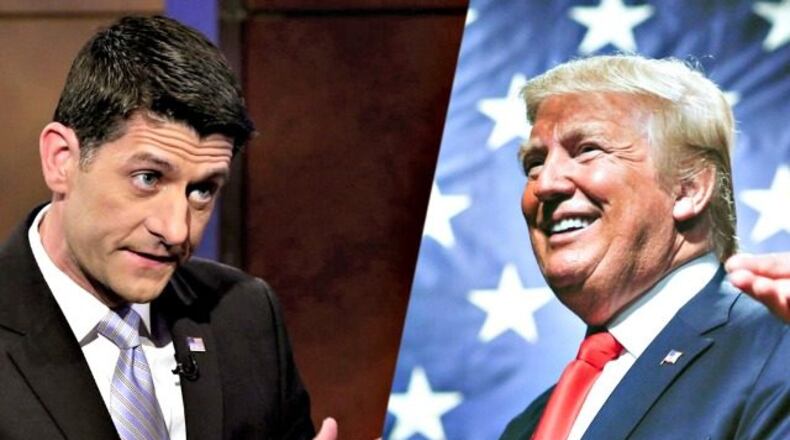It's a big day in Washington today. Donald Trump, having seized at least temporary control of the Republican Party, descends upon the city that he hopes to make his home for the next eight years, and he has the place all in a titter.
Some, including more than a few Republicans, remain horrified at the thought that Mister Trump might be transformed into Mister President a few months from now; others are eager to greet the conqueror, to kneel and kiss the Trumpian ring, hopeful that they might prosper at his feet. As Rachel Lu writes in National Review, they have "sold their conservative birthright for a mess of white-identity politics," and appear quite pleased with the deal.
The most important of Trump's several meetings today is that with Paul Ryan, who has so far withheld his endorsement. The speaker of the House has said he needs the conversation to determine whether true party unity -- unity based on shared ideals and goals -- is possible with Trump as the GOP nominee.
"We have to be a party that is broad and inclusive, that is principled, that applies those principles to the problems of the day, offering the country better solutions and actually appeals to independents and disaffected Democrats," Ryan told the Wall Street Journal.
(UPDATE: After his private meeting with Trump, Ryan said this morning that he was "very encouraged" about the prospect of unifying the party but would not yet commit to endorsing his party's presumptive nominee, pending additional discussions.)
Personally, I read that list and conclude that Ryan cannot, in the end, find it possible to endorse Trump. At least not with any degree of honesty or plausibility. There is no honest, plausible way to reconcile a demand for "a broad and inclusive" party with a candidate who dismisses Mexican immigrants as rapists and killers, who wants to bar Muslims from entering the country. There is no way to fool yourself into seeing Trump as a man of any principle whatsoever, let alone conservative principle.
Those who claim that they are waiting to see if Trump can change his nature or "tone it down" are in truth telling us that they themselves are malleable. They know that Trump is not capable of change; he is who he has shown us to be. He seeks no goal other than his own advancement and the gratification of his own ego, and he recognizes no limits on what he will do or say to achieve that gratification.
It's also important to remember that this is a man who launched his entrance into politics by publicly espousing the conspiracy theory that Barack Obama was not born in this country, and thus was an illegal usurper as president. Trump even dispatched investigators to Hawaii to uncover the truth, proudly telling the media that "I have people that have been studying it and they cannot believe what they're finding."
"We're looking into it very, very strongly. At a certain point in time I'll be revealing some interesting things ... you'll be very surprised," Trump said at the time. We have yet to hear what they found, but we do know what Trump found. He found a political environment in which such things could be said without penalty. From there, he has since gone on to publicly embrace other bizarre nonsense, such as the suggestion that Ted Cruz's father helped to assassinate JFK.
Again, in a sane time, in a sane political party, such tin-foil-hat statements would disqualify a candidate for running for a lowly town council seat. But in these times, in this party, they allow you to become the presumptive GOP nominee to be president.
Ryan recognizes the bizarreness of the situation, just as he recognizes the very great danger to both his party and country. But he also must feel very great internal GOP pressure to pretend otherwise. He is being told that to balk at endorsing Trump is to open the doors of the White House to the woman whom the right has turned into a cartoon character named Hitlery, the Hildabeast, Killery Klintoon. He is also being reminded that whether he likes it or not, Trump is the choice of the GOP electorate, and that he should bend to that decision.
It's not a comfortable position, but in mulling his dilemma perhaps Ryan should seek guidance from the words of Edmund Burke, the 18th century English statesman who is widely considered the intellectual father of modern conservatism. Among other things, Burke rejected the idea that elected representatives are "bound blindly and implicitly to obey, to vote, and to argue for" things that the public may support temporarily but that are "contrary to the clearest conviction of his judgment and conscience."
"Your representative owes you, not his industry only, but his judgment; and he betrays, instead of serving you, if he sacrifices it to your opinion," Burke warned.
By the way, he also warned that “rage and frenzy will pull down more in half an hour than prudence, deliberation, and foresight can build up in a hundred years.”
About the Author
The Latest
Featured



